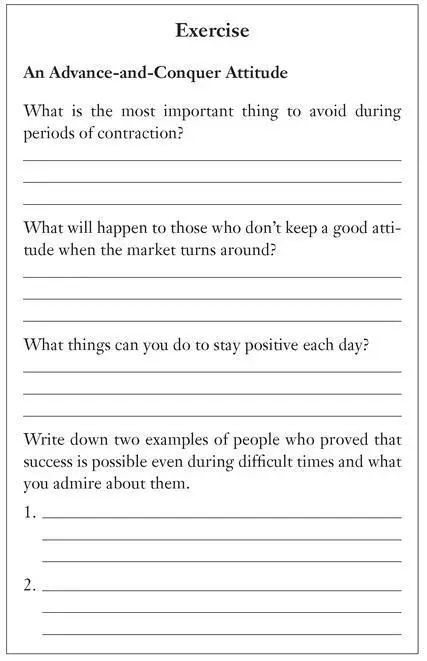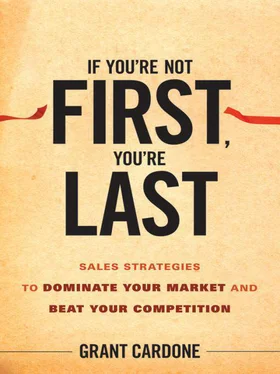Grant Cardone - If You're Not First, You're Last - Sales Strategies to Dominate Your Market and Beat Your Competition
Здесь есть возможность читать онлайн «Grant Cardone - If You're Not First, You're Last - Sales Strategies to Dominate Your Market and Beat Your Competition» — ознакомительный отрывок электронной книги совершенно бесплатно, а после прочтения отрывка купить полную версию. В некоторых случаях можно слушать аудио, скачать через торрент в формате fb2 и присутствует краткое содержание. Год выпуска: 2010, ISBN: 2010, Издательство: Wiley, Жанр: small_business, на английском языке. Описание произведения, (предисловие) а так же отзывы посетителей доступны на портале библиотеки ЛибКат.
- Название:If You're Not First, You're Last: Sales Strategies to Dominate Your Market and Beat Your Competition
- Автор:
- Издательство:Wiley
- Жанр:
- Год:2010
- ISBN:9780470645918
- Рейтинг книги:3 / 5. Голосов: 1
-
Избранное:Добавить в избранное
- Отзывы:
-
Ваша оценка:
- 60
- 1
- 2
- 3
- 4
- 5
If You're Not First, You're Last: Sales Strategies to Dominate Your Market and Beat Your Competition: краткое содержание, описание и аннотация
Предлагаем к чтению аннотацию, описание, краткое содержание или предисловие (зависит от того, что написал сам автор книги «If You're Not First, You're Last: Sales Strategies to Dominate Your Market and Beat Your Competition»). Если вы не нашли необходимую информацию о книге — напишите в комментариях, мы постараемся отыскать её.
If You're Not First, You're Last: Sales Strategies to Dominate Your Market and Beat Your Competition — читать онлайн ознакомительный отрывок
Ниже представлен текст книги, разбитый по страницам. Система сохранения места последней прочитанной страницы, позволяет с удобством читать онлайн бесплатно книгу «If You're Not First, You're Last: Sales Strategies to Dominate Your Market and Beat Your Competition», без необходимости каждый раз заново искать на чём Вы остановились. Поставьте закладку, и сможете в любой момент перейти на страницу, на которой закончили чтение.
Интервал:
Закладка:
Here are some tips for staying positive:
1. Write positive reminders in places you can see in your work environment. Counter negativity with optimistic messages, pictures, and notes.
2. Get on my Rules of Success program for 13 days. This eight-hour program is used over a period of 13 days to shift your thinking and your actions.
3. Exercise each day.
4. Start reading positive books. Try to complete one to three chapters per day.
5. Write down your future goals and dreams daily in present tense as though the goal has been achieved. For example, “I own a helicopter” or “My income is _____.”
6. Create and commit to a disciplined schedule, and do not deviate from it.
7. Get an agreement from friends, family, and coworkers to knock off all negativity, and make a game of it. Post a sign at your home or office that says, “ No negativity allowed here! ”
8. Consider getting rid of all toxins, chemicals, and contaminants in your body. All of us store chemicals and environmental toxins in our bodies that might be the cause of negativity, depression, fear, insecurity, laziness, and anxiety. These toxins—accumulated in your body’s fat cells from poor nutrition and drink choices, environmental chemicals, pesticides, prescription medicine, drugs, and alcohol—can hinder your mood, focus, and energy level. I went through a purification process and the results were amazing; I immediately had more energy and clearer thoughts.
9. Replace negative thinking with positive thinking. Remember that a major problem during all of this talk of recession is that once people believe there is going to be a recession, they start to feel, see, and experience those things that are consistent with a recession. They then start to exhibit negativity about their business prospects and see only what they believe. Remember that no matter what you see, hear, or read, you ultimately make the choice about what you think.
Negative beliefs quickly affect your outlook and the way you feel about the future prospects of your business. You have to counter the negativity in the marketplace by replacing it with positive thinking. Just by asking certain questions, you can shift your attention from good to bad. Asking what’s wrong with the economy often highlights exactly that—what is wrong . But altering that question just a bit by instead asking yourself what you can do to sell something today immediately shifts your attention to solutions and away from the problem.
One way to get yourself out of a hopeless state is to increase urgency and necessity. For instance, if your life depended on getting a sale today, you would get a sale—regardless of the economy. Take a cue from children; they continue to focus on getting what they want despite any “recession” because they pay more attention to the outcome than the problem. Children will relentlessly pitch as though their lives depend on it—usually until they close the “deal.”
Having the most supportive belief structure possible is essential to succeeding in any market and absolutely vital to selling in a tough one. Adopting a winning belief system does not mean that you’re in denial. It just means you make the most of every opportunity with a can-do attitude.
There are always opportunities to thrive, regardless of the economic nature of the times. History has countless examples of businesses that found great success during challenging financial circumstances. Ray Kroc bought McDonald’s during a recession in 1953 and went on to build the largest fast food restaurant on the planet. Walt Disney went bankrupt several times before developing the largest entertainment company in the world—one that survived the Great Depression and seven recessions. The F. W. Woolworth Company—now known as Foot Locker—was founded with a loan of $300 during the Long Depression, which lasted 23 years. School dropout and child runaway Harland Sanders sold his recipe for Kentucky Fried Chicken after nine years of effort—during two recessions and while living on Social Security checks at the age of 65.
Even in the middle of the darkest economic times, you don’t want to have your eyes shut. Be aware, observe, and look for every problem because every problem equals an opportunity. During all times—but especially tough times—people want to work with the most positive and most professional people in the market. Competitors who struggle with negativity translate into more sales for you—if you stay positive.
Be sure you sign up for my “strategy of the week” at www.grantcardone.com. We will send you free strategies with tips on staying positive, expanding, increasing sales, and more. I also offer multiple sales programs on CD and video, even virtual training programs that are available to you 24 hours a day through your computer. These provide training on how to use a positive, solution-oriented sales approach to maximize every opportunity you encounter. These programs have helped thousands of people gain control of their attitudes, make the most of every opportunity, and manage their environments.
Nothing—not your product, service, or company—is more valuable than the ability to maintain and deliver a positive attitude. This influences every area of your life—your physical health, your mental state, and your financial well-being. Money and success are more likely to move toward those who are able to maintain an upbeat, solution-oriented, can-do attitude. Be the placebo effect for yourself and all those around you—and make sure it is a positive effect.

CHAPTER 17. Your Freedom Financial Plan
While some mistakenly say that “the love of money is the root of all evil,” I believe it is more accurate to suggest that the lack of knowledge about money is the cause of most people’s financial problems. So many of us have so much false information regarding money, finance, budgets, debt, and income that it is no wonder that most people never accumulate much wealth. If you misunderstand money, how effective can you possibly be at acquiring or keeping it? Foreclosures, bankruptcies, out-of-control debt, failing businesses, and a government unable to even balance its books all point toward a culture that is either lacking or has incorrect information on the topic of money. I would honestly expect that it is a great deal of both.
I obtained an accounting degree in college because I thought I would be better served in the business world if I understood money, finances, and accounting. But after five years in college, degree in hand, I couldn’t get a job, didn’t know how to produce income or balance a checkbook, lacked any practical understanding about money or finances—and owed the government $70,000. I think this is the case with most people—whether they have a degree or not. People tend to think that attending college will provide them with this information, but in truth, it often does not.
Most of this country’s failing banks are run by individuals who went to some of the highest-ranked, best-known business schools on this planet. Yet they still seem to lack knowledge about how to keep their own businesses viable and solvent. Even people who think they know about money seem a bit confused—and you don’t have to look far to see this. People wonder, where do I invest? Do I want debt? Is a home an asset or a liability? What is the difference between a budget and a financial plan? Is all credit bad? Should I invest in stocks, bonds, or mutual funds? Is my money safe in the banks? What is an IRA, Keogh, or 401(k)?
I know people who won’t buy anything if it isn’t on sale yet who are still broke because they don’t understand how to produce income. They spend their entire life thinking money is scarce, when in reality, it’s merely a currency printed by man. I also know people who know how to produce income but never learn how to manage it and end up with none of it. While most of us believe that money isn’t the only element of happiness, we know that it’s necessary to maintain a comfortable life. People who go to work every day and earn just enough to pay their bills need not wonder why they aren’t motivated. You cannot possibly be driven to succeed if you have no clue what to do with the rewards of your efforts. In order to survive and prosper during a recession, it is vitally important to at least understand the basics about money—including terminology—in order to eliminate confusion. For instance, what is the difference between income and cash flow, “good” and bad debt, or assets and liabilities? The degree to which you understand words is the limit to which you can understand subject matter. (That’s why I designed a glossary for the back of this book—so that you can look up new words and increase your understanding of business and financial terminology.)
Читать дальшеИнтервал:
Закладка:
Похожие книги на «If You're Not First, You're Last: Sales Strategies to Dominate Your Market and Beat Your Competition»
Представляем Вашему вниманию похожие книги на «If You're Not First, You're Last: Sales Strategies to Dominate Your Market and Beat Your Competition» списком для выбора. Мы отобрали схожую по названию и смыслу литературу в надежде предоставить читателям больше вариантов отыскать новые, интересные, ещё непрочитанные произведения.
Обсуждение, отзывы о книге «If You're Not First, You're Last: Sales Strategies to Dominate Your Market and Beat Your Competition» и просто собственные мнения читателей. Оставьте ваши комментарии, напишите, что Вы думаете о произведении, его смысле или главных героях. Укажите что конкретно понравилось, а что нет, и почему Вы так считаете.












